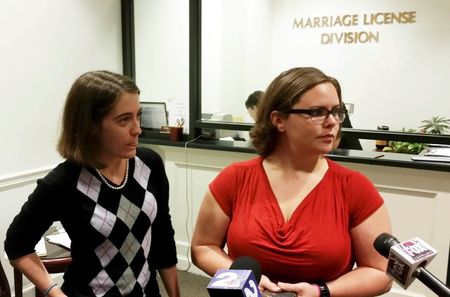By Lawrence Hurley
WASHINGTON (Reuters) - The U.S. Supreme Court on Thursday cleared the way for South Carolina to become the 35th U.S. state where gay marriage is legal, denying a request to block same-same weddings from proceeding.
The order was another victory for gay marriage advocates after a federal judge in Montana on Wednesday struck down that state's ban on same-sex marriage.
"We're really thrilled," said Jeff Ayers, board chairman of South Carolina Equality. "This proves that all the way to the highest court, these were our rights from the beginning."
South Carolina's attorney general had asked the high court to temporarily block a lower court's ruling that overturned the state's ban.
After the Supreme Court's order, South Carolina Attorney General Alan Wilson, a Republican, said he hoped the high court, which has so far declined to take up cases that would lead to a definitive ruling on gay marriage, would ultimately uphold the ban.
Gay marriage advocates in Louisiana said on Thursday they had joined those asking the high court to rule on the issue.
There are already cases involving bans in Kentucky, Michigan, Ohio and Tennessee pending at the court, which will likely decide by the end of the year whether to hear one or more of them.
The South Carolina ban was struck down last week by U.S. District Judge Richard Gergel, who ruled the state was bound by the 4th U.S. Circuit Court of Appeals decision striking down a similar law in Virginia.
Gergel put his ruling on hold for a week to allow the state to appeal, with the 4th Circuit on Tuesday refusing to block it.
In Montana, where U.S. District Judge Brian Morris overturned that state's ban on same-sex marriage as unconstitutional, dozens of couples married at county courthouses on Thursday.
A lesbian couple who successfully challenged the prohibition were the first to receive a marriage license at the Cascade County Courthouse in Great Falls, said Amy Cannata of the American Civil Liberties Union of Montana.
While gay marriage advocates have had the upper hand in the courts in the past year, a Cincinnati-based federal appeals court on Nov. 6 became the first to uphold gay marriage bans.

That decision by the 6th U.S. Circuit Court of Appeals created a split within the courts, increasing the chances the Supreme Court will rule on the issue.
(Reporting by Lawrence Hurley in Washington; Additional reporting by Harriet McLeod in Charlotte, North Carolina and Laura Zuckerman in Salmon, Idaho; Writing by Jonathan Kaminsky; Editing by Frank McGurty, Bill Trott and Peter Cooney)